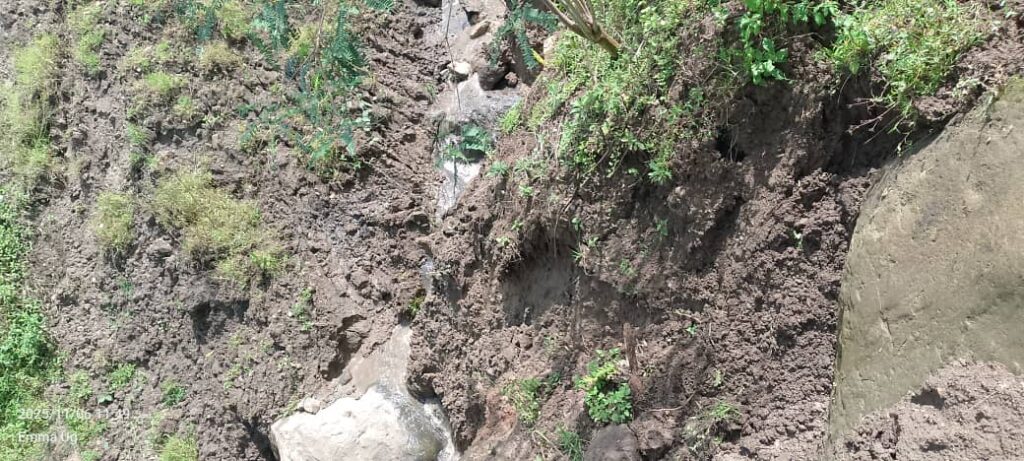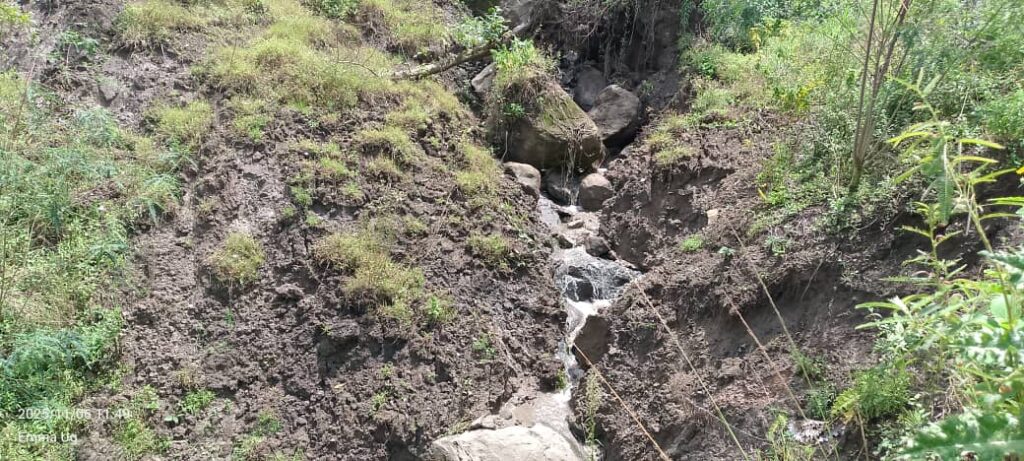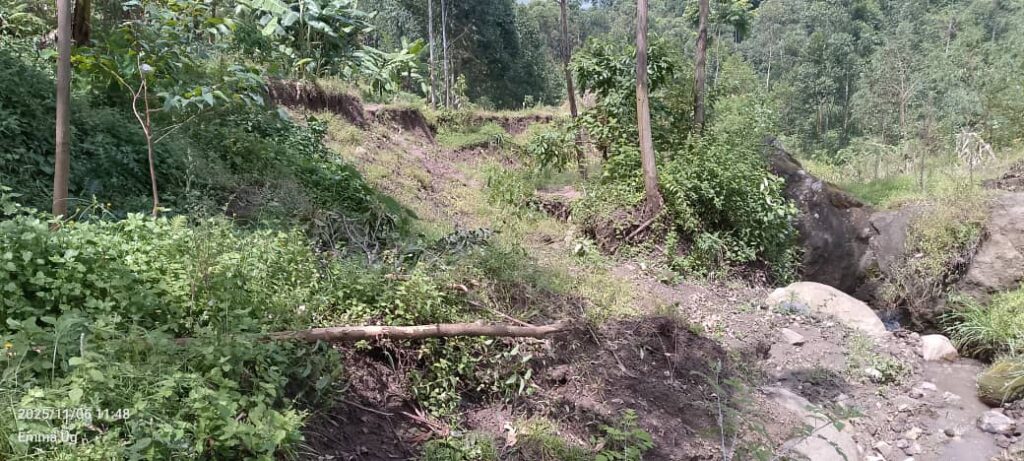
 Time FM
Time FM

 Time FM
Time FM
25 November 2025, 8:44 pm

By Gerald Welikhe
In Buwere Parish, Bupoto Sub-County, Namisindwa District, deep gullies are tearing through farmland, with severe soil erosion threatening the livelihoods of entire communities in Eastern Uganda.
Recent documentation from 6 November 2025 reveals the alarming extent of land degradation, prompting local leaders and residents to urgently call for government intervention before more families lose everything.
For 62-year-old Mukhwa Richard Watira, a lifelong resident of Buwere Parish, the changes have been devastating. “When I was a young man, these hillsides were covered with thick vegetation. The streams were gentle, clear waters that we drank from without fear. Now the land is being eaten away before our very eyes, and we are helpless to stop it,” he says.
The erosion channels present a sobering picture of environmental destruction. Modest streams during the dry season transform into torrents during the rains, carving gullies several metres deep and wide through the hillsides. Massive boulders now sit exposed on pedestals of eroded soil, while tree roots dangle in mid-air, their supporting earth washed away. In some sections, near-vertical drops of three to four metres have turned gentle slopes into hazardous terrain.
Wamono Alex, a local farmer whose land borders one of the worst-affected areas, has watched helplessly as his farmland is destroyed each rainy season. “Last year, I lost almost half an acre to the expanding gully,” he says. “My coffee trees, which were 50 metres from the erosion, are now standing on the edge. I know that by next year, they will be gone. This is my family’s livelihood disappearing, and nobody seems to care.”
Buwere Parish lies in the Mt. Elgon region, where steep terrain and heavy rainfall, combined with cleared hillsides and poor land management, create conditions for rapid erosion. Without protective vegetation, water flows swiftly across the surface, gaining destructive power as it descends and cutting channels that grow wider and deeper with each rain.
Mututa Martine, the area councillor representing Buwere Parish, has been documenting the erosion’s devastating impact. “This is not just affecting one or two families,” he explains. “Entire communities are being displaced. People’s homes are at risk. Their farmland, which has sustained families for generations, is being washed away. We have people who can no longer access their own properties because the paths have been cut by these gullies.”
The economic impact of the erosion is severe. Mukhwana describes the decline in agricultural productivity: “When I first started farming, we could plant anything and it would grow abundantly. Now, many of us are struggling to grow even basic food crops. The good soil is gone, washed down into the valleys.”
Reduced crop yields mean less food security and lower incomes for families already struggling. Farmers are forced to buy more fertilisers to replace lost nutrients, raising production costs, while some fields have become completely unusable.
The erosion has also contaminated water sources. “Our water sources are now brown with mud most of the year,” Wamono Alex explains. “During the rains, you cannot drink from the streams at all. We have to walk much farther to find clean water, and some families are falling ill from the water they have no choice but to use.”
The situation has reached a critical point, with local leaders and residents making desperate appeals to government authorities for immediate intervention.
“We are calling on the government to come and survey this area immediately,” Councillor Mututa states emphatically. “We need technical experts to assess the situation and design proper interventions. We need the Ministry of Water and Environment to deploy their soil conservation teams. We need the district to allocate emergency funds for stabilisation measures. Most importantly, we need rescue for those families who have lost their land, homes, and livelihoods.”
His frustration is evident: “We report, we write letters, we attend district meetings, but the response is always slow or insufficient. Meanwhile, with every rain, the situation worsens. People are suffering now. We need action immediately.”

Mukhwana Richard Watira, a respected elder, is advocating for immediate government intervention. “I am calling on the government, from the sub-county level all the way to Kampala, to treat this as the emergency it is. Come and see what is happening here. Survey the damage. Then help us fix it before it is too late,” he urges.
He is particularly concerned about the lack of support for families who have lost property. “When a road project takes someone’s land, they are compensated. However, when nature, worsened by neglect and poor planning, destroys someone’s land, where is the help? These people deserve government support.”
Wamono Alex speaks for many affected farmers: “I have six children. Three are still in school. My farming was how I paid their school fees, how I fed them. Now I don’t know what the future holds. If this erosion continues, I will have nothing left. I am begging the government to come and help us. We cannot fight this alone.”
Councillor Mututa estimates that over 100 acres of productive farmland in Buwere Parish alone have been severely affected or completely lost to erosion. “That represents millions of shillings in lost agricultural production every year,” he reports. “It represents food that could have fed families, school fees that won’t be paid, medical care that can’t be afforded.”
Beyond economic losses, the erosion poses direct safety threats. Unstable gully walls can collapse without warning. Mukhwana recounts a frightening incident: “During the heavy rains in April, a large section of the gully wall collapsed in the middle of the night. It took several trees with it and nearly reached a family’s home. People are sleeping in fear.”
Traditional paths connecting homesteads to schools, water sources, and markets have been cut by expanding gullies, forcing residents to take long detours. For the elderly and sick needing medical care, these delays can be life-threatening.
Local leaders have outlined clear priorities for government intervention. First, an immediate technical survey by environmental engineers and soil conservation experts to assess the damage and design stabilisation measures. Second, emergency interventions, including check dams and water diversion structures, to prevent further expansion of the worst gullies. Third, support for affected families who have lost property or livelihoods.
Long-term solutions require comprehensive watershed management: reforestation of upper slopes, soil conservation farming techniques, permanent erosion-control structures, and community education programmes.

“We farmers are willing to work and to learn better methods, but we need help,” Wamono Alex emphasises. “Give us training, tree seedlings, materials to build erosion-control structures, and experts to show us how. We will work hard to save our land.”
Mukhwa adds a final plea: “I am 62 years old. I have seen many promises made and forgotten. But this is about survival. This is about preventing a complete environmental collapse. I am begging the government – please act before it is too late.”
The erosion crisis in Buwere Parish demands an immediate government response. The voices of Mukhwa Richard Watira, Mututa Martine, and Wamono Alex carry urgent truth for a community watching their futures wash away.
The question is whether their calls will be answered while there is still time to save Buwere Parish from complete environmental collapse. For the residents, the message is clear: survey our land, witness our suffering, and help us save what remains before it all disappears.